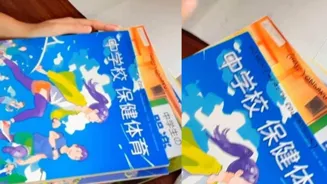Japan is often admired for its discipline and unique way of making daily tasks simple. One reason behind this is the kind of education children receive from an early age. Recently, an Indian family living
in Japan shared an interesting look at class 9 textbooks. While Indian students usually focus on subjects like English, science and maths, Japanese students are introduced to many practical life skills.
They study lessons on job skills, teamwork and even household tasks such as cooking and planting. There are books on Japanese literature, grammar and sentence building as well, which help them grow academically.
Indian Family Shows Glimpse Of Textbooks In Japan
As per the student, there is a Job Skill book that teaches students about different kinds of jobs and useful work skills. The Jujutsu and Technology book includes lessons on new structures, bullet trains, growing plants and other life skills. Doutoku is the moral education book, which guides students on how to behave in public, how to keep society clean and how to live responsibly at home. Kateika is the home economics book, where students learn how to interact with others, cook simple meals and work on group projects. Kokugo focuses on Japanese literature, grammar and sentence formation. Rika is the science textbook.
Math lessons are also different from India; what Indian students study in 9th grade, Japanese students often learn in 8th. Other subjects include an English course, Rekishi is a history book, which covers Japan’s ancient past, along with topics like the French Revolution and various dynasties and a Geography book, which includes both Japan and the wider world. The best part of Japanese schooling is that there is no stress or pressure.
Social Media Reacts With Surprise
Reacting to the post, a user wrote, “Bhaii iski books kitni rang birangi hai, mujhe bhi chahiyeee. Mere books mein toh picture hii nahi rehte. (Their books are so colourful, I want them too. My books don’t even have pictures.”
“Kitni easy book hai or ek bharat wale itni moti book de denge 2 parts mein. (Such an easy book, but in India they give such thick books, divided into two parts),” a comment read.
An individual stated, “Japan is really beautiful.”
One more added, “Wow, in 6 months she already understands Japanese.”
Until junior high school, exams are not counted and marks are not added. This allows students to learn freely without tension.













